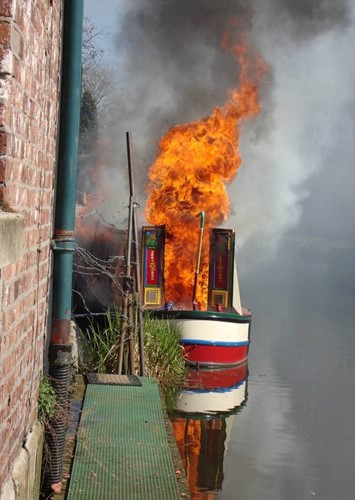Boat Fire Safety
Fires on boats have killed 30 people in the last 20 years. Most fires are preventable. Follow our safety advice to protect your boat and crew from fire, and what to do should a fire break out.
Smoke alarms save lives
Fire can spread quickly on a boat, even on water and just like at home, smoke alarms will give you and your crew vital early warning.
- Fit alarms in places you will hear them clearly if they go off
- Test the smoke alarm(s) regularly
Fire isn't the only thing you need to watch out for. Make sure you also have a carbon monoxide (CO) alarm. Check your CO alarm is suitable for marine use.
Safety Check List
- Everybody aboard needs to know the emergency and escape plan
- Get to know how to use the fire blanket and fire extinguishers
- Test your smoke alarms monthly
- Keep escape routes clear - if a fire wakes you up, you've got to get out fast
- If the boat's occupied, ensure doors and emergency exits will open from the inside
- Don't leave the galley when cooking and don't cook while tired
- Don't use portable LPG camping equipment aboard
- Dispose of cigarettes carefully - put them out, right out
- Keep fabrics like curtains, towels and clothing safely away from hobs and heaters
- Handle petrol away from the boat - keep petrol vapour out of the cabin
Safe Cooking
- Turn cooking appliances off properly after use. Never leave cooking unattended
- Avoid cooking when tired or if you have been drinking or taking medication that makes you drowsy
- Keep cooking areas clear from flammable items and make sure you clean cooking areas regularly
- Spark devices are safer than matches or lights to light gas cookers
- Only use portable appliances onshore and don't change gas canisters inside the cabin or covered areas
- Ensure all hob burners have a flame supervision device to shut off the gas if the flame is blown out
- Barbecues should NOT be used on boats. Hot charcoal gives off dangerous amounts of CO and blown embers could set your boat alight
Smoking
Don't smoke if you're drowsy because of medications or alcohol and NEVER smoke when refuelling or changing a gas cylinder.
More safety advice around smoking can be found on our website.
Candles
Consider using LED candles instead of real candles. If you have to use tea lights, make sure you use an appropriate holder. Make sure candles are kept away from flammable items and are completely extinguished when you leave the boat or go to bed.
More safety advice around candles can be found on our website
Electrics
Don't overload your adaptors - keep to one plug per socket. Check your electrical appliances are in good working order. If wires are damaged or frayed, don't use them. Unplug appliances when they're not in use or when you leave the boat.
More safety advice around electrics can be found on our website
Fuel and Power
Make sure you check and maintain your boat's fuel, gas and electrical systems on a regular basis.
- Don't let oil or debris build up in the bilges
- Inspect surfaces and items adjacent to exhausts for signs of heat damage or charring
- Check exhaust systems of inboard engines for leaks
- Check for loose fuel joints, damaged fuel tanks or deteriorating hoses
- Keep boat doors, windows and hatches closed when refuelling
- Refuel outboard engines and generators away from the boat
- Make sure any leaks or spills are cleaned up immediately
- Only carry spare petrol if necessary and store it in a self-draining locker or on open deck
- Take extra care when reinstalling the boat's batteries. Check straps or restraints are secure afterwards
Useful Links
For more information on boat fire safety, visit www.boatsafetyscheme.org/fire [external link - opens in new window]
RoSPA - The Royal Society for the Prevention of Accidents [external link - opens in new window]
Staywise - a collection of educational resources [external link - opens in new window]
RNLI - Royal National Lifeboat Institution [external link - opens in new window]
Canal and River Trust [external link - opens in new window]
RLSS - The Royal Life Saving Society [external link - opens in new window]
Maritime and Coastguard Agency [external link - opens in new window]

